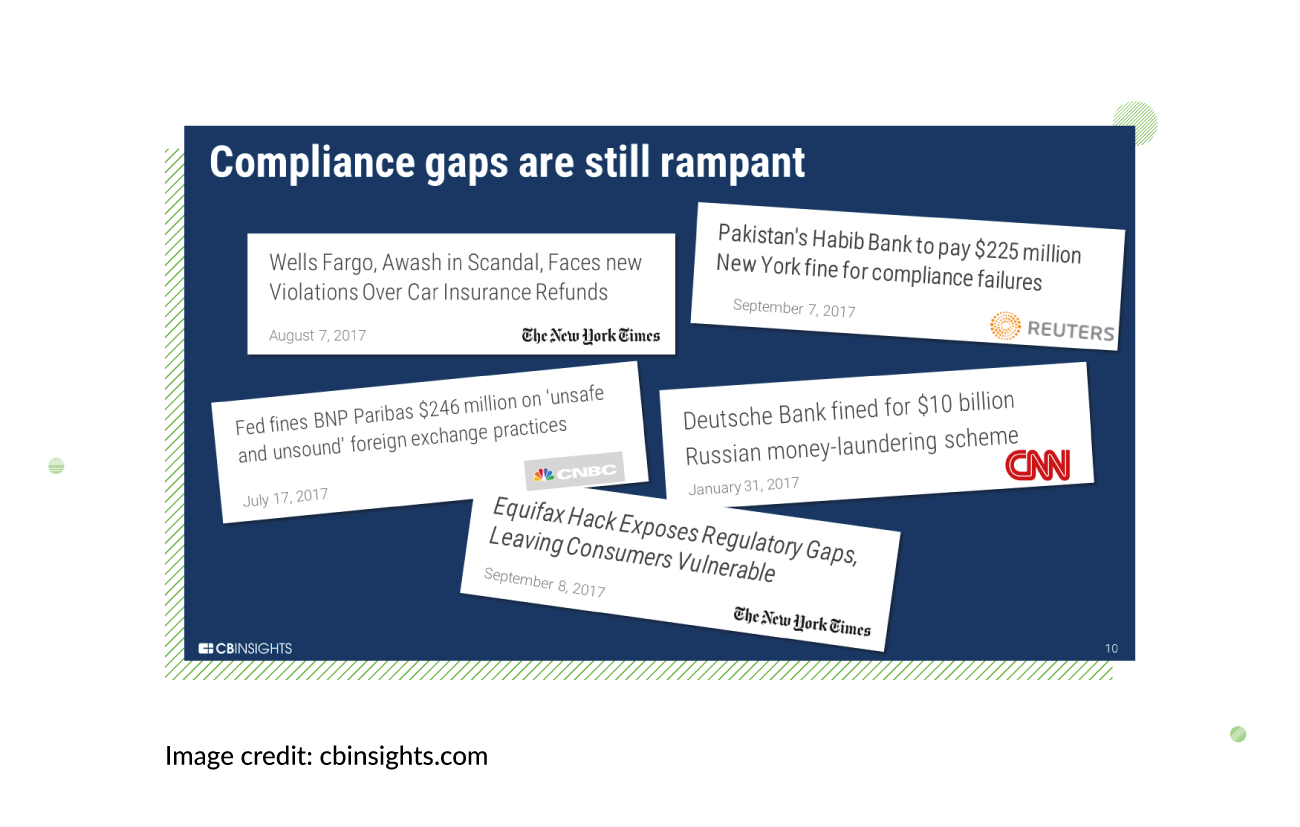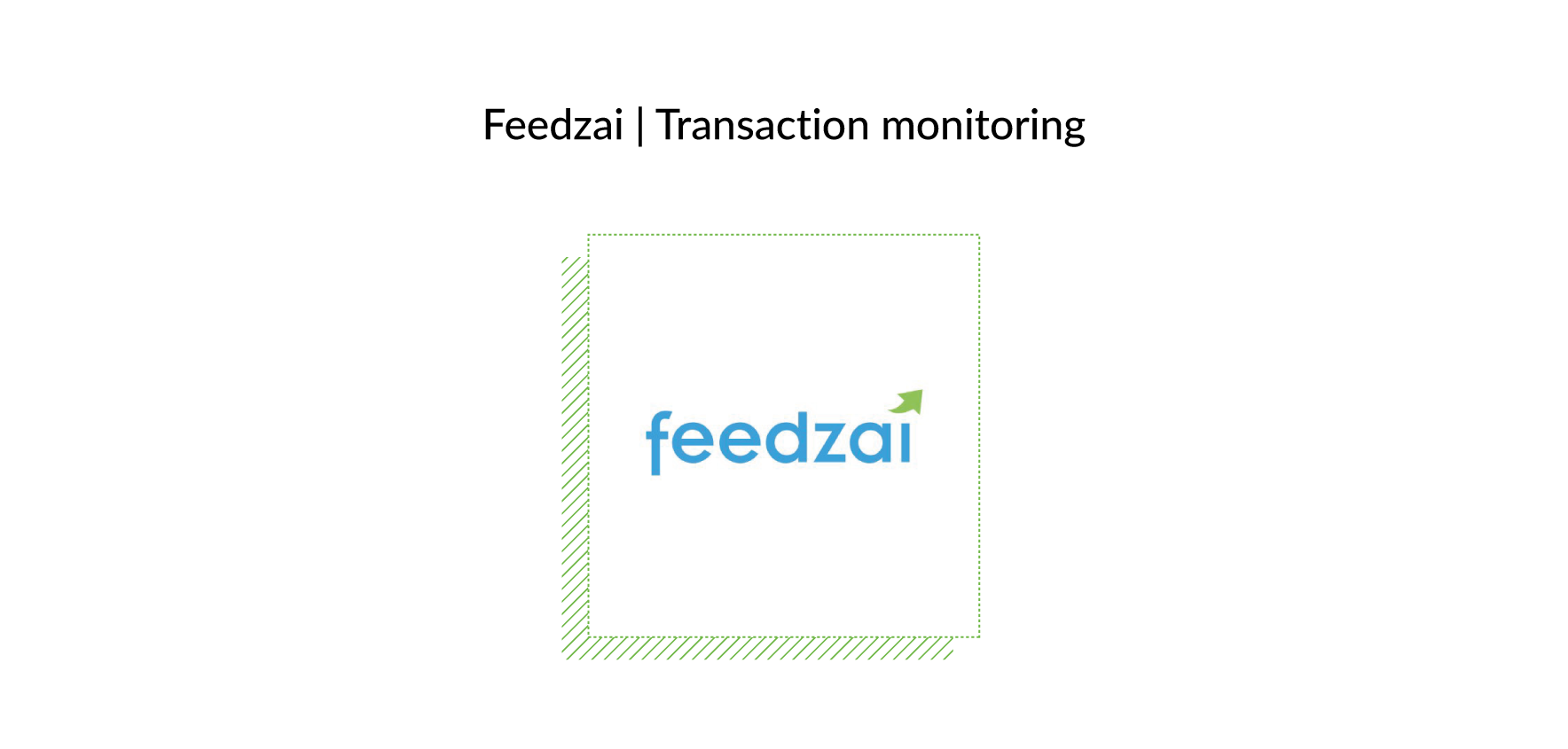What Is RegTech: A Complete Guide for 2025

Here comes RegTech — a new technology field that ensures that companies, especially tech firms, act in accordance with implemented government rules and regulations.
The first time we came across the term RegTech was when our team was delivering Python development services to Clear Minds — an investment platform that acts as a digital adviser for people who want to make profitable investments in the long run. During the final stages of development, in May 2018, the GDPR came out.

If you’re lucky enough to have never dealt with GDPR, I will briefly summarize what it is. It’s a regulation created by the EU that forces companies that work with customers’ personal data — in our case, tech companies — to protect the information they capture. Namely, they cannot disclose it to third parties, and must even delete it if a customer asks them to. GDPR is the reason why your email boxes were recently bombarded with new Terms & Conditions and Privacy Policies of all the services you were using or subscribed to.
Like many other companies, we faced a problem with storing personal data. Not only did we have to study the law itself; we also had to understand how it would affect Clear Minds and what we had to do to comply with the regulation. And we weren’t alone.
In this guide, as a fintech software development company we’ll describe RegTech in FinTech, explore the latest trends in fintech and innovations in RegTech development, and provide key considerations for building a successful RegTech product. Whether you’re a fintech startup looking to disrupt the industry or an established financial institution seeking to improve your compliance processes, this guide is for you.
Key Challenges in the Financial Industry
The financial industry is being reshaped by new regulatory demands, growing risks, and a flood of complex data. To stay competitive, firms increasingly turn to RegTech compliance solutions to simplify audits and automate monitoring.Yet, beyond technology, building true resilience demands strategic shifts in operations and governance.
The evolving role of RegTech in financial services highlights the need for smarter risk frameworks and stronger data ecosystems.
Modern institutions must rethink how they handle information flows, regulatory reporting, and internal controls.
With tailored RegTech software development, companies can transform compliance, risk, and data management into real strategic assets.
Regulatory Compliance
Keeping pace with constantly shifting regulations is one of the biggest burdens financial institutions face today. A misstep isn’t just costly — it can be catastrophic for reputation, customer trust, and operational continuity. Effective regulatory compliance demands more than checking boxes; it requires dynamic systems that adapt to new rules before they even hit the market. Traditional manual approaches simply can’t keep up with the speed and complexity regulators now expect. That’s why companies are turning to specialized RegTech solutions designed to monitor, report, and adjust compliance processes in real time. Automation, centralized dashboards, and predictive analytics allow organizations to spot potential risks early and respond intelligently. By weaving regulatory compliance deeper into business operations, financial firms not only meet legal standards — they create a foundation for sustainable growth and competitive advantage.
Risk Management
In today’s volatile financial landscape, risk is no longer confined to markets — it’s embedded in operations, cybersecurity, and even customer relationships. Managing risk effectively means moving beyond reactive models and toward proactive, real-time strategies. Manual risk assessments are increasingly being replaced by smart systems that predict vulnerabilities before they escalate. Here, RegTech software becomes a critical tool: automating monitoring, scoring threats, and helping decision-makers prioritize actions. From fraud detection to operational risk modeling, advanced solutions give companies the foresight they need to safeguard assets and reputations. But risk management isn’t just about technology — it’s about embedding risk awareness into every level of the organization. The firms that thrive tomorrow will be those that integrate technology and human expertise into a single, agile defense.
Data Management
Data is the new currency of financial services — but without the right systems in place, it can quickly become a liability instead of an asset. Managing data today isn’t just about storage; it’s about governance, security, accessibility, and real-time insights. Organizations face growing pressure to consolidate fragmented data, comply with privacy regulations, and derive actionable intelligence faster than ever. This is where RegTech technology plays a transformative role: automating data validation, securing sensitive information, and standardizing flows across complex environments. Effective data management powered by smart RegTech tools turns compliance from a bottleneck into a catalyst for innovation. Companies that build intelligent data ecosystems not only strengthen their regulatory posture but unlock new opportunities for personalized services, risk prediction, and strategic growth.
What is RegTech?
RegTech, Regulatory Technology, has become a cornerstone of modern financial services. But at its core, the RegTech meaning is simple: using advanced technologies to help businesses meet regulatory requirements faster, more efficiently, and with greater accuracy. Instead of relying on traditional, manual compliance processes — which are slow, expensive, and prone to errors — RegTech offers automation, real-time monitoring, and predictive analytics to stay ahead of shifting rules. What sets RegTech apart isn’t just speed, but the ability to turn compliance from a reactive burden into a proactive strategy. RegTech solutions cover a wide range of applications: from automated reporting and anti-money laundering (AML) checks to cybersecurity risk assessments and customer onboarding verification. As regulations grow increasingly complex, RegTech is no longer a luxury for financial institutions — it’s a necessity for staying compliant, protecting data, and building operational resilience in a constantly changing landscape.
How Does RegTech Works
RegTech solutions combine data aggregation, machine learning, real-time monitoring, and automated reporting into one cohesive system. First, data is pulled from multiple internal and external sources, then standardized for instant analysis. Algorithms detect anomalies, flag risks, and predict compliance issues before they escalate.
The strength of modern RegTech solutions lies in continuous, real-time data processing — not periodic manual updates. Secure cloud environments and APIs enable a live exchange of information between businesses and regulatory bodies, reducing delays and human error. Automated reports, audit trails, and compliance alerts become part of daily workflows, not isolated tasks.
Scalability is another key principle. Companies can implement targeted tools like AML monitoring, KYC verification, or real-time transaction tracking without rebuilding their entire IT architecture. Modular deployment ensures RegTech adapts to each organization’s size, market, and regulatory profile. However, reaching this level of integration requires more than buying ready-made products. Custom RegTech software development is essential to align technology with business goals, risk appetite, and specific jurisdictional needs. Tailored platforms allow financial institutions to embed compliance into their operations without sacrificing agility.
In the end, RegTech is a strategic shift. Done right, it helps firms anticipate change, reduce risk, and strengthen their competitive position in an increasingly complex regulatory world.
RegTech and FinTech: Key Differences
Although RegTech and FinTech both emerged from the wave of digital innovation in finance, they pursue different missions. FinTech is centered around enhancing customer experience—through mobile banking, payment apps, and investment platforms. RegTech, by contrast, focuses on helping businesses meet regulatory obligations and manage operational risks.
While FinTech drives disruption, RegTech provides the structure that allows innovation to happen securely. RegTech compliance tools automate time-consuming tasks like regulatory reporting, transaction monitoring, and risk detection. Their purpose is not to deliver new financial products, but to ensure organizations stay aligned with complex, ever-changing legal frameworks.
The flexibility of RegTech is key. Unlike most FinTech solutions aimed at end-users, RegTech compliance solutions must continuously evolve in response to new legislation, cross-border regulations, and industry-specific standards. They integrate deeply into internal systems, offering transparency, auditability, and resilience behind the scenes.
In essence, RegTech and FinTech serve different sides of the same coin: one shapes how finance looks to the outside world, the other protects its internal integrity. Successful institutions invest in both to compete and to survive.
Benefits of RegTech in Fintech
As fintech companies scale, so does regulatory complexity. Understanding what is regtech in fintech is key: it’s the integration of advanced technologies with compliance expertise to manage regulatory obligations dynamically, not reactively. In today’s environment, regtech in fintech offers institutions a path to smarter growth, operational resilience, and stronger regulatory trust. Here’s how RegTech delivers real strategic advantages:
1. Automation of Compliance Processes
RegTech replaces manual workflows with intelligent automation, minimizing human error, accelerating reporting, and streamlining audit preparation. Compliance becomes an integrated, continuous function instead of a disruptive afterthought.
2. Real-Time Risk Detection
AI-driven RegTech platforms monitor financial activities in real time, spotting suspicious behaviors and potential vulnerabilities early. This reduces exposure to fraud, operational disruptions, and reputational damage.
3. Faster Response to Regulatory Changes
Automated updates and real-time alerts allow businesses to adjust compliance processes immediately when new regulations appear. Rather than scrambling to catch up, institutions embed compliance agility into daily operations.
4. Cost Efficiency and Operational Optimization
By automating data collection, validation, and reporting, RegTech significantly cuts compliance costs. Teams can redirect resources from manual control tasks toward innovation, customer service, and strategic initiatives.
5. Seamless RegTech Implementation
A successful regtech implementation ensures new compliance tools integrate quickly and flexibly with legacy systems. Companies maintain operational continuity while modernizing their regulatory frameworks without major overhauls.
6. Minimization of Fines and Penalties
Automated compliance workflows and predictive risk detection help avoid reporting delays, missed obligations, and penalties. With greater transparency across operations, companies protect themselves against costly regulatory infractions.
7. Future-Proofing Compliance Frameworks
Predictive analytics and smart compliance tracking allow organizations to monitor upcoming regulatory trends. Firms that anticipate, rather than react to, change strengthen their resilience and stay competitive in fast-moving markets.
8. Strengthening Competitive Position
Companies that invest early in RegTech gain a dual advantage: faster innovation cycles and deeper trust from regulators and clients. RegTech-driven institutions not only meet legal standards — they set new ones for operational excellence and transparency.
What’s Wrong with Regulatory Compliance?
The problem is that (1) GDPR is only one of the hundreds of other regulations that companies have to comply with. And (2) new regulations appear faster than companies can analyze them and take the corresponding action. Hiring additional legal staff and forming a compliance department isn’t something that all tech companies can afford, never mind startups.
Of course, many firms decided to ignore the regulation — but hey, GDPR fines can be up to €20m and 4% of a company’s annual revenue. I doubt that anybody who’s sane would take such a huge risk. Although non-compliance with any regulation may result in enormous fines, some companies still think, “Well, I don’t care.” That’s a big no-no. Usually, breaking government regulations or even one-time malpractice will result in huge fines, then scandals, and eventually a trial. CB insights made a terrific compilation of 2017 headlines that illustrates the problem:

Key Features of RegTech Solutions
Regulatory Technology (a.k.a. RegTech) is any technology that aims to standardize regulatory processes, create unambiguous interpretations of the regulations, and, most important — automate the compliance process. To characterize the RegTech industry, Deloitte analyzed around 333 RegTech companies and identified 5 main categories of Regulatory Technology.

Let’s dive deeper into these categories and consider how artificial intelligence can contribute to automating each of them. This will help us understand why excluding the human factor by using AI-based tools offered by RegTech developers is more effective than traditional manual operations.
Compliance
The regulations landscape is extremely dynamic, which makes it nearly impossible for a human to keep up with the latest updates. Here’s exactly where AI and machine learning enter the picture, as they can perform such regulatory compliance activities as:
- Searching for new or reviewed regulations
- Analyzing the collected information
- Reporting
- Sharing the impact of changes with the stakeholders, etc.
AI algorithms can be trained to automatically perform these tasks, with appropriate reviews at key decision points made by the compliance officers.
64% of companies that have already adopted AI tools name compliance requirements one of their main reasons for doing so. These include:

Identity management and control
The Know Your Customer (KYC) process covers client identity authentication and screening. It’s common to perform it the old-school way, manually working with documentation, but RegTech developers rely on advanced data aggregation and analysis tools. Again, AI and machine learning can expand the scope of the KYC process by gathering information from multiple sources that usually requires hours of searching and ultimately may never be found.
Risk management
Some RegTech solutions can continuously monitor risks. That is, they learn to identify insecure situations based on predefined data. In the financial sector, RegTech solutions use advanced analytics and big data to predict market changes and mitigate similar risks. After all, machines are far better with numbers than people.
The adopters of AI tools for FCRM consider them to be most effective for performing the following activities:

Regulatory reporting
Few people enjoy drawing up reports, and even fewer actually create them. But this is work you have to do, whether you’re a clerk or a high-ranking executive. But people tend to make errors in reports, and this results in unclear or incorrect data. Robotic Process Automation (RPA) makes data management processes work without employees being involved. The result is correct data, reported on time.
Here are a few of the processes in regulatory reporting that can be optimized thanks to AI instruments:
- Data validation
- Analytical calculations
- Categorization and classification
- Data processing and preparation
- Regulatory change management, etc.
Automation of these activities results in significant time- and cost-savings.
Transaction monitoring
This is the process of monitoring financial transactions that go through banks, online shops or other financial institutions to identify suspicious activity and flag it as illegal. There’s normally a separate department in a bank that performs this work. They have certain standards regarding what should be considered suspicious. Like the previous point about reporting, RPA can analyze and monitor transactions faster and more accurately than any professional.
As you can see, most solutions, regardless of the category, utilize RPA, Big Data Analysis, AI, and Machine Learning.
If you’re interested in exploring the role of Python in fintech, particularly in the field of RegTech, check out our another informative article.
How to Develop a High-Performing RegTech Solution
Developing an effective RegTech product demands more than just coding — it requires strategy and precision. Here’s a proven approach:
- Set Compliance Goals: Define which regulatory challenges the platform must solve to ensure a targeted development process.
- Evaluate System Readiness: Analyze existing IT infrastructure for compatibility and identify necessary integrations.
- Focus on User Simplicity: RegTech compliance solutions must be intuitive, minimizing friction for compliance teams and regulators.
- Build for Flexibility: Effective regtech software development creates modular systems that scale and adapt to regulatory shifts.
- Integrate Real-Time Intelligence: Use live analytics to detect risks early and automate compliance responses.
- Maintain Continuous Updates: Plan for ongoing testing and updates to align the solution with evolving laws and standards.
Technologies Driving RegTech Solutions
The rapid growth of RegTech relies on cutting-edge technologies that transform how financial institutions manage compliance. Leading regtech companies strategically apply innovative tools to create smarter, faster, and more adaptable regulatory systems. Here’s a closer look at the technologies driving this transformation:
AI and Machine Learning
The impact of AI in RegTech is profound. Machine learning models analyze complex datasets to detect anomalies, predict risks, and automate compliance workflows. By enabling real-time risk scoring and proactive issue detection, AI reduces manual processes and improves the accuracy of regulatory management. For modern regtech companies, AI integration is no longer optional — it defines the competitive edge.
Blockchain
Blockchain offers new levels of transparency and security. Immutable ledgers ensure that once data is recorded, it remains verifiable and tamper-proof — critical for audits, KYC processes, and regulatory reporting. As regtech companies explore decentralized compliance frameworks, blockchain enables trust between regulators and institutions without intermediaries.
Big Data and Analytics
The explosion of financial data demands smarter tools. Regtech software uses big data to collect, normalize, and interpret vast information streams from multiple sources. This supports predictive compliance strategies, real-time reporting, and dynamic risk management. Big data transforms regulatory tasks from static checklists into adaptive, intelligence-driven processes.
Cloud Computing
Cloud technology underpins the scalability and flexibility needed for effective RegTech platforms. Hosting compliance systems in the cloud enables faster deployment, real-time collaboration, and seamless integration with legacy infrastructures. Cloud-based solutions also ensure that regulatory updates can be rolled out instantly, minimizing disruption and keeping firms agile in a fast-changing legal environment.
Key Players in Regtech
The Regtech industry has witnessed significant growth in recent years, with numerous companies emerging as key players in this field. These companies offer innovative solutions to assist financial institutions in meeting regulatory requirements and managing compliance effectively. Here are a few examples of regtech companies making an impact in the industry:
- ComplyAdvantage. ComplyAdvantage utilizes artificial intelligence and machine learning to provide real-time risk intelligence solutions. Their platform helps businesses in identifying and mitigating risks associated with money laundering, terrorist financing, and other financial crimes.
- Onfido. Onfido specializes in digital identity verification and authentication. Their advanced technology combines biometrics, machine learning, and document verification to enable secure and frictionless customer onboarding processes, meeting KYC (Know Your Customer) and AML (Anti-Money Laundering) requirements.
- Behavox. Behavox focuses on compliance monitoring and employee conduct solutions. Their platform leverages advanced analytics and natural language processing to detect and prevent regulatory breaches, insider trading, and other misconduct within organizations.
- ClauseMatch. ClauseMatch offers a comprehensive regulatory technology platform for managing compliance and documentation. Their solution enables financial institutions to streamline the creation, collaboration, and tracking of policies, procedures, and internal controls, ensuring regulatory alignment.
- RegTek.Solutions. RegTek.Solutions provides regulatory reporting solutions to streamline reporting processes for financial institutions. Their platform automates data validation, enrichment, and submission, ensuring accurate and timely reporting in compliance with regulatory requirements.
These examples represent just a fraction of the diverse range of regtech companies operating in the industry. With their innovative technologies and solutions, these key players are driving the transformation of regulatory compliance in the financial sector, helping organizations navigate complex regulatory landscapes more efficiently and effectively.
Examples of RegTech Solutions for Banking and Fintech
In this section, I’ll provide you with a few concrete RegTech examples and explain how they help businesses. Despite the areas that Deloitte has identified, most solutions are cross-industry and comprise several technologies that solve a set of problems in a particular industry. However, my list includes five companies that best fit banking and fintech companies.

Provenir is a risk analytics system that integrates with, as the founders claim, “virtually any structured and instructed data source quickly” and creates risk analyses based on preset parameters. By data source, they mean that they can operate with Twitter, Facebook, Salesforce and many other tech giants. The great thing about Provenir is that it can be used in a variety of different industries, from e-commerce websites to banks. By the way, HSBC is its largest client, which makes it one of the best RegTech examples in the banking sector.

Continuity is a US service that provides regulatory compliance services. The system monitors the US Federal Register and, depending on the client’s business area, interprets changes to the regulations that apply to the client company. So instead of hiring a huge compliance department, a company can use Continuity to save staff time. Moreover, Continuity offers a Unified Compliance Management System Model. You just schedule compliance tasks, and the compliance management process becomes automated.

IdentityMind provides a platform that performs a KYC process: it finds, maintains, and analyzes digital identities, which allows companies to identify a person, perform regulatory identification, and detect and prevent identity fraud. For commercial businesses, it means fewer frauds and protection from money laundering. They also have a base of 20 partner companies that provide data, services, and technology to support larger data operations.

Luxembourg is famous for two things: it’s one of the smallest European countries, and it has an excellent economy. It’s no wonder that Luxembourg is the home to Regis-TR, a RegTech development company that offers a reporting system for all kinds of trade transactions for various assets in the EU. Their reporting system is compliant with three regulations: EMIR, FinfraG, and SFTR. The company plans to create an ecosystem that enables clients to report their data to only one entity at a time and not violate any requirements in different jurisdictions.

Feedzai, as its founders describe it, is an “AI platform to fight financial crime.” Simply put, it detects fraud in omnichannel commerce by offering banks and commercial businesses payment processors protection. They use historical and behavioral analysis of data to identify whether a transaction is potentially suspicious or not.
As you can see, RegTech isn’t something vague and unclear. It’s just that the entire RegTech industry is B2B, so consumers are unlikely to ever come across it.
Django Stars Experience in RegTech Development
Django Stars has been providing product development services since 2008. In fintech, one of our priority industries, compliance with regulatory requirements is an essential part of creating software. Our engineers’ track record includes, for example, regtech-related development for:
- an Australian cloud and cybersecurity service provider Smile IT that helps companies prepare for CMMI and comply with regulatory requirements,
- Swiss Fin Lab that builds solutions for managing personal data and personal wealth, and
- an Irish Regtech Miura that provides automated regulatory compliance and automated reg change management services.
Bottom Line
RegTech is software that helps companies, primarily FinTech ones, comply with established regulations. Most solutions rely on the continuous utilization of machine learning and AI in Financial Services to exclude human error from regular processes like reporting and risk management.
The RegTech market isn’t stable, since governments tend to establish new regulations every year, based on technological progress. Think about the crypto market. Ten years ago, nobody attempted to regulate it. Over the last three years, governments have been trying to figure out how to control it. This clearly demonstrates that RegTech is just starting to develop — and that the more regulations that hit the books, the more solutions we’ll see.
If you’re looking to leverage opportunities in the growing RegTech industry, contact Django Stars. Our experienced team can help you build innovative software solutions to navigate regulatory challenges and stay ahead of the curve.
- Is RegTech a part of FinTech?
- Yes. RegTech, short for regulatory technology, refers to the use of technology and innovative solutions to address regulatory challenges and compliance requirements in the financial industry. It is a subset of the broader FinTech industry, which encompasses various technologies and innovations that enhance and disrupt traditional financial services. However, RegTech solutions can also be applied in other industries where regulatory requirements exist, and there is a need for automation and optimization of compliance processes.
- How is RegTech changing the FinTech industry?
- RegTech is revolutionizing the FinTech industry by leveraging technology to streamline regulatory compliance, enhance risk management, and improve operational efficiency. It enables financial institutions to automate compliance processes, detect and prevent financial crimes, ensure data security, and navigate complex regulatory landscapes more effectively. RegTech solutions also provide real-time monitoring and reporting, reducing costs and saving time for businesses.
- What are some future trends in RegTech development?
They include
- the increased use of artificial intelligence and machine learning for advanced risk assessment and compliance monitoring,
- the integration of blockchain technology for secure and transparent regulatory reporting,
- the expansion of RegTech solutions for emerging technologies like cryptocurrency and decentralized finance, and
- the collaboration between regulators and RegTech companies to establish regulatory sandboxes and foster innovation.
Additionally, the focus on data privacy and cybersecurity will continue to shape RegTech development, with an emphasis on ensuring the secure handling and protection of sensitive data.
- What are some key considerations for building successful RegTech software solutions?
- Compliance expertise
- Scalability and flexibility
- Data security and privacy
- Automation and efficiency
- Integration capabilities
- User experience
- Continuous monitoring and updates
- Collaboration and partnerships








